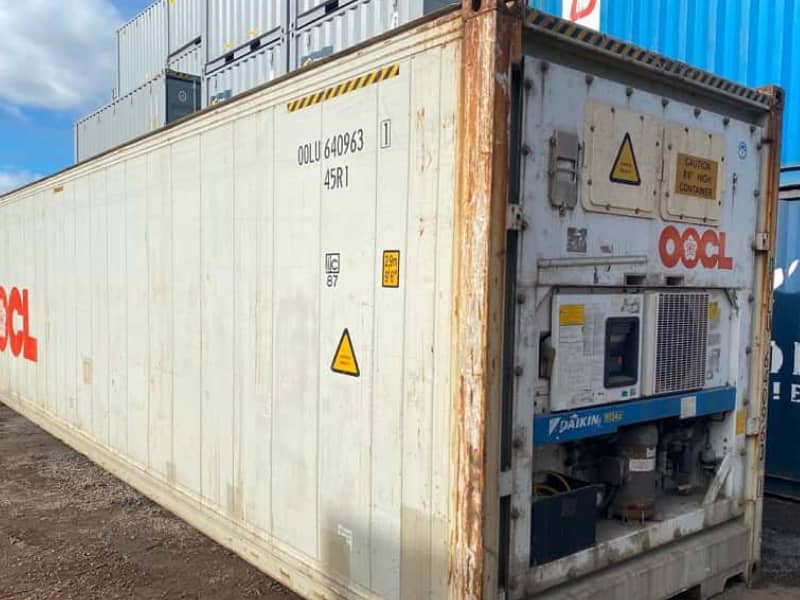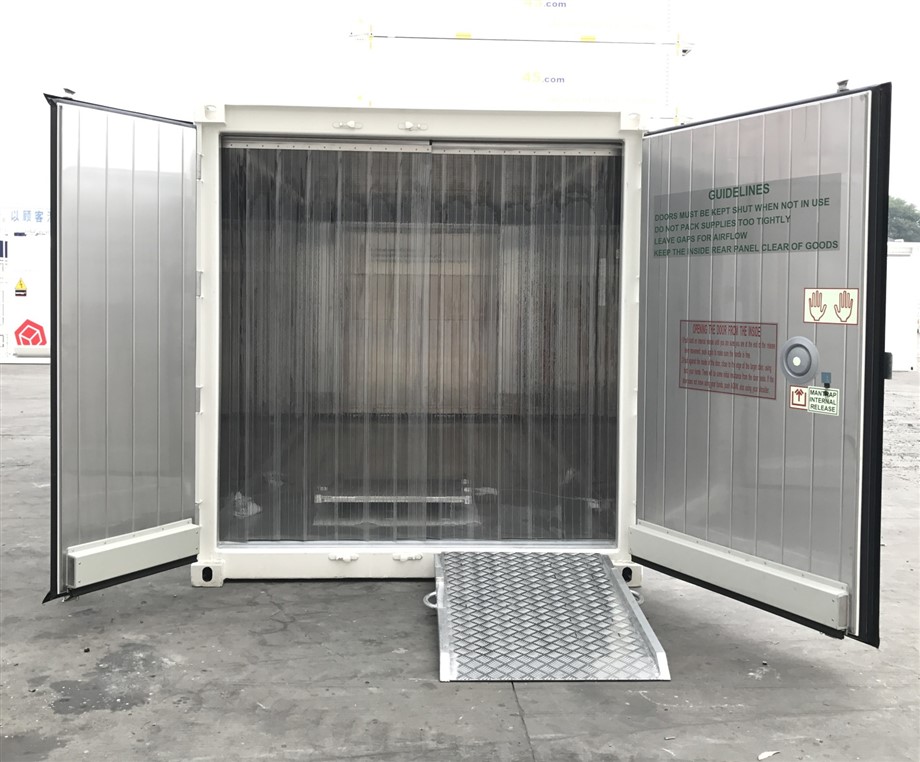All Regarding Cold Storage Containers: Vital Insights for Your Storage Space Needs
Freezer containers play an essential duty in the conservation of perishable products. They come in different types, consisting of refrigerated and protected systems, each designed for certain storage space needs. Recognizing the benefits and key functions of these containers is essential for companies intending to enhance their procedures. As the demand for effective storage space services expands, checking out the different options offered can cause informed choices that impact both productivity and sustainability. What factors should one consider when choosing the ideal container?
Kinds Of Cold Store Containers
Cold storage containers come in different kinds, each created to fulfill particular temperature level control requirements. Amongst the most usual kinds are refrigerated containers, which maintain temperatures in between 0 ° C to 10 ° C, making them ideal for perishable items like fruits, veggies, and milk items. One more kind is the deep fridge freezer container, which operates at temperature levels listed below -18 ° C, ideal for long-term storage of icy items such as meats and seafood.
Shielded containers provide temperature level security without active air conditioning, making them valuable for short-term transportation of temperature-sensitive items. In addition, there are mobile cold store systems, which provide versatility in areas and are typically used in occasions or seasonal procedures. Blast refrigerators rapidly lower the temperature level of hot foods, making certain safety and top quality. Each kind offers an unique objective in different markets, from food solution to drugs, highlighting the relevance of selecting the right container for particular storage space needs.

Advantages of Making Use Of Cold Store Solutions

Chilly storage space solutions prolong the rack life of products, reducing waste and enhancing success for organizations. By effectively taking care of stock with appropriate temperature control, firms can enhance their supply chains and enhance functional performance.
Additionally, cold store facilities permit adaptable storage space alternatives, suiting numerous volume needs and seasonal variations popular (used 40ft refrigerated shipping containers). This adaptability aids services respond promptly to market changes
Using cool storage space solutions can ensure compliance with health and safety regulations, guarding both organizations and consumers. In general, the strategic usage of cool storage boosts product monitoring while promoting sustainability and economic stability.
Key Attributes to Try To Find in Cold Storage Containers
When choosing freezer containers, several key functions value mindful consideration to safeguard peak performance and reliability. Initially, temperature level control capacities are essential; containers need to preserve constant temperatures suitable for certain items. Insulation high quality likewise plays a significant function, as remarkable insulation reduces energy intake and boosts temperature security.
Next, ease of gain access to and loading is crucial; containers ought to provide straightforward designs for reliable handling and company. Toughness is an additional essential facet; weather-resistant materials ensure durability and secure contents versus environmental elements.
In addition, wheelchair attributes, such as built-in wheels or raising points, facilitate transportation, while customizable formats permit for customized storage space services.
Monitoring systems, consisting of temperature level alarm systems and remote monitoring, provide real-time updates, making specific that problems continue to be perfect. By concentrating on these functions, individuals can select cold store containers that fulfill their functional needs properly.
Choosing the Right Freezer Container for Your Needs
Choosing the appropriate cool storage container calls for a thoughtful analysis of particular needs and operational needs. Aspects such as the sort of items being kept, temperature level of sensitivity, and volume must be focused on. As an example, subject to spoiling food items might require containers with stringent temperature level controls, while pharmaceuticals might require exact problems to maintain effectiveness.
In addition, prospective individuals should consider the container's size and wheelchair. A larger system may be essential for bulk storage space, while smaller sized, mobile alternatives can be ideal for on-site or short-term demands. Insulation quality and energy performance are additionally important, as these will certainly influence operational expenses and temperature security.
Lastly, conformity with industry policies and standards is vital, particularly in fields like food and health care. By very carefully assessing these facets, users can choose a cold store container that effectively satisfies their special demands and warranties optimum storage space conditions.
Best Practices for Keeping Cold Store Conditions
Preserving optimal cold store problems is vital for preserving the top quality and security of temperature-sensitive products. Regularly keeping an eye on temperature and humidity levels is essential; utilizing reliable digital thermostats and hygrometers can offer accurate readings. Additionally, proper insulation of freezer containers aids reduce temperature level changes and energy loss.
Executing a first-in, first-out (FIFO) system assures that older stock is made use of before more recent stock, minimizing waste (used 40ft refrigerated shipping containers). Furthermore, preserving an organized design within the storage area enables far better airflow and minimizes the danger of cross-contamination
Routine upkeep examine equipment, such as seals and compressors, are important to prevent malfunctions. Team training on finest techniques for loading and dumping products aids maintain temperature level honesty. Maintaining doors shut as much as feasible limits warmth exchange, guaranteeing that the cool storage setting remains reliable and steady in protecting beneficial items.
Cost Considerations for Cold Storage Solutions
When examining freezer remedies, it is crucial to take into consideration the initial investment prices together with recurring operational expenditures. A complete malfunction of these prices can disclose substantial lasting cost savings potential for businesses. Comprehending these monetary aspects helps stakeholders make informed decisions concerning their freezer requirements.

Preliminary Investment Prices
The monetary landscape of freezer containers provides numerous preliminary investment expenses that businesses have to think about. These prices normally consist of the acquisition or rental price of the containers, which can differ based upon insulation, type, and dimension top quality. Furthermore, expenditures related to retrofitting existing structures to accommodate freezer should be factored in, specifically if specialized devices is needed. Installation expenses, consisting of electrical work and refrigeration systems, also add to the general preliminary investment. Businesses should not ignore transport expenses for supplying containers to their preferred location. Prospective customization alternatives, such as shelving or temperature level surveillance systems, can better impact the initial monetary expense. Mindful budgeting for these variables is necessary for effective cold store implementation.
Functional Expenses Failure
Operational costs for cool storage space solutions encompass numerous important expense considerations that businesses should browse. Trick variables consist of power expenses, which can be substantial because of the demand to maintain reduced temperature levels. Upkeep expenditures are also considerable, as routine maintenance is necessary to guarantee equipment runs successfully and remains compliant with health and safety and security requirements. Furthermore, labor costs may emerge from the demand for specialized staff to check the storage space and take care of setting. Insurance coverage expenditures are an additional consideration, as business must safeguard their investments against prospective losses. Any possible regulative compliance expenses should be factored in, as organizations might require to website spend in systems that stick to food security and environmental laws. Understanding these costs is essential for efficient budgeting.
Long-Term Savings Potential
Purchasing cold store solutions uses substantial long-term cost savings possibility, changing first expenditures into monetary effectiveness gradually. By minimizing putridity and waste, services can boost their revenue margins considerably. Advanced insulation and energy-efficient systems lower energy prices, which build up over the life-span of the equipment. Additionally, cold store containers commonly need much less constant maintenance compared to conventional refrigeration methods, bring about lower repair expenses. The capability to store items for prolonged periods without jeopardizing quality allows services to take advantage of on market changes, enhancing income. In addition, the scalability of cool storage services allows firms to adapt to transforming demands without sustaining too much costs. Generally, these factors add to an engaging instance for cold store as a cost-effective investment strategy.
Regularly Asked Concerns
How Much Time Can Food Be Stored in Freezer Containers?
The duration food can be saved in cool storage space containers differs by type. Typically, subject to spoiling products last from days to weeks, while frozen foods can continue to be secure for months, depending upon appropriate temperature and storage space problems.
Are Cold Store Containers Energy-Efficient?
The energy effectiveness of cold storage space containers differs based on design and insulation quality. Modern devices usually utilize sophisticated technology to reduce energy usage, ultimately contributing to minimized functional costs and ecological influence in lasting use.
Can Cold Storage Space Containers Be Custom-made for Details Demands?
Cold storage containers can undoubtedly be customized to satisfy specific demands. Alterations might consist of temperature controls, dimension changes, and extra features, allowing customers to tailor solutions properly for different storage space needs and operational preferences.
What Are the Common Dimensions of Freezer Containers?
Cold storage space containers commonly come in standard dimensions such as 10, 20, and 40 feet. These dimensions suit different storage space demands, guaranteeing adaptability for businesses needing temperature-controlled settings for subject to spoiling goods or delicate materials.
Do Cold Store Containers Require Special Authorizations for Use?
Cold storage space containers typically require special licenses for use, depending upon neighborhood laws and planned applications. Authorities may mandate licenses to ensure security criteria, environmental conformity, and appropriate functional methods are preserved during their use.
Cold storage space containers come in different types, each created to meet particular temperature level control demands. Additionally, cool storage space facilities allow for versatile storage options, fitting numerous quantity needs and seasonal variations in demand. Selecting the right cool storage container calls for a thoughtful analysis of operational requirements and details demands. The financial landscape of chilly storage containers offers different initial investment costs that organizations must consider. Cold storage space containers can without a doubt be customized to meet specific needs.